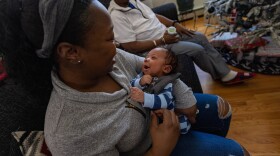-
As many as 40% more Black male patients in the study might have been diagnosed with breathing problems if current diagnosis-assisting computer software was changed, the study said.
-
On this episode, we talk about the factors that increase the risk of skin cancer in people with darker skin tones.
-
The University of Florida health system is exploring ways to better engage Black adults in need of health care.
-
Infant mortality rates across the South are by far the worst in the U.S. A look at South Carolina — where multimillion-dollar programs aimed at improving rates over the past 10 years have failed to move the needle — drives home the challenge of finding solutions.
-
An EEG can help diagnose conditions like epilepsy, sleep disorders and brain tumors. But a design flaw and outdated Eurocentric practices make the test less effective on thicker, denser and curly hair types.
-
A Boston hospital gets daily, home blood pressure checks for moms at risk for the pregnancy complication, pre-eclampsia. The effort is a response to alarming rates of Black maternal mortality.
-
Many Black patients also try to be informed and minimize questions to put providers at ease. “The system looks at us differently,” says the founder of the African American Wellness Project.
-
Historically neglected by sunscreen manufacturers and a medical community lagging in diversity and cultural competency, many people with dark skin tones have not been informed about sun safety or how to monitor their skin for damage or cancer.
-
Environmental justice advocates were circulating a petition for counties across Florida to use electric school buses at a weekend event to distribute free menstrual products and diapers in Tampa.
-
In the first study to look at asthma treatments for Black and Latino patients, researchers at the University of South Florida and around the nation spent more than three years developing solutions to historic inequities in care.
Play Live Radio
Next Up:
0:00
0:00
Available On Air Stations










